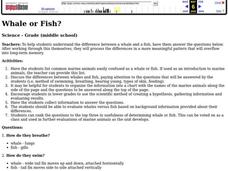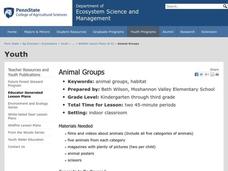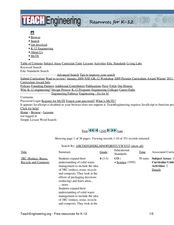Curated OER
Whale or Fish?
Middle schoolers explain the difference between a whale and a fish. After working through this themselves, they process the differences in a more meaningful pattern that overflows into long-term memory.
Curated OER
Exploring With Photograms
Students observe the interaction between energy absorbed, reflected or transmitted through an object in a photochemical process with a classroom demonstration.
Curated OER
U.S. History: de Soto's Alternate Route
Eighth graders examine various maps associated with Hernando de Soto's expedition. By comparing their textbook maps with newer maps, they answer a battery of focus questions. Using Microsoft Word, 8th graders answer the questions...
Curated OER
Classifying Living Things
Young scholars identify how to classify living things. They classify various concepts including family members, kinds of clothing, numbers, shapes, and vocabulary words. They discuss how to classify various concepts and classify...
Curated OER
The Biosphere
In this biosphere worksheet, students identify the different levels of organization that ecologists study. Students complete charts, sentences, and answer short answer questions.
Curated OER
Ten Important Hardwoods
Students discuss ten important Pennsylvania hardwood trees, examine characteristics of each tree species, evaluate economic and ecological importance of hardwood trees, and recognize at least two characteristics of each species.
Curated OER
Animal Groups
Students explore animal groups. In this animal science lesson, students use pictures from magazines and classify the animals into five categories. Students share why they categorized the animals the way they did.
Curated OER
Groundwater Realities
Students review the components of the scientific inquiry method. In groups, they use the internet to research the sustainability of water resources in their community. They examine an environmental impact study, answer questions and...
Curated OER
Bird Populations
students study bird migratory patterns and the methods that researchers use to study them. Students are introduced to the concepts of the study of bird movements.The skill of scientific questioning is used to find results.
Curated OER
Detection Detective
Students describe what each detection method uses and rank the wavelengths of each if appropriate. They answer questions about absorption, importance of materials and explain differences. Students make sure they describe diagnostic uses...
Curated OER
Watershed Awareness
Students investigate the relationship between upstream influences in their watershed and the watershed's estuary. They apply the scientific process to test a hypothesis while examining the impact of upland activities on estuaries.
Curated OER
Seeds and Similarities
Students use the scientific inquiry method to identify the changes in a plant's life cycle. In groups, they plant different types of plants and use a chart to compare and contrast their growth rates. They share their conclusions with...
Curated OER
What was Newton's Idea of Science?
Students form logical foundations for analysis of observations. They improve analytic reading abilities through practice. Students investigate the foundations of scientific thought processes and how to apply them.
Curated OER
What Does It Eat?
Young scholars, working in research teams, investigate the eating habits of crickets. They collect and record data and compare their methods and results with other groups by making tables or graphs. They sumarize their findings with...
Curated OER
SIM Ecosystem
Students identify and interpret the concept of an ecosystem and the potential impact humans have on ecosystems. They also proficient in organized and methodical Internet searches. Finally, students become proficient with public...
Curated OER
From Molecules to Mole Day Do's
Students recognize methods used to define the mole. After converting various quantities to the mole, students provide a context for understanding the usefulness of scientific notation and the mole.
Curated OER
Where's the Water?
Fifth graders conduct an investigation into water purification during a role play situation in an Amazon Rainforest. They design a scientific experiment for cleaning and filtering water.
Curated OER
Science: Trouble in the Troposphere
Students research a NASA Website and record information about an assigned city's tropospheric ozone residual monthly climate. In groups, they graph the information for the past year. They form new groups and compare their city's...
Curated OER
Illinois' Habitats Happening
Students use the scientific inquiry method to examine the ecosystems and biomes in Illinois. Using the characteristics of a local habitat, they identify the best conditions for an ecosystem to survive and how a slight change can damage...
Curated OER
An Introduction to Thermal Spray Technology
Students discuss difference between kinetic and thermal energy, develop and demonstrate understanding of key concepts and characteristics underlying thermal spray techniques, list items used in their daily lives that are coated, examine...
Curated OER
Separation of Unknowns in a Liquid
Students identify chromatography as method of separating the components of a liquid. Students discover that dyes are composed of more than one component in achieving a particular color in these lessons on paper chromatography.
Curated OER
Investigating How Pollutants Travel Through Groundwater
High schoolers determine how pollutants can travel though sediment and explore methods of pollutant removal. They conduct an experiment on porosity and permeability of soils and simulate an EPA "pump and treat" method for removing...
Curated OER
Plants Under Attack
Third graders will identify the four needs for plant survival and gain skills and confidence in using scientific measurement tools, probes as well as the spreadsheets and graphing capacity of a computer to represent and analyze data.They...
Curated OER
Interior of the Earth
Sixth graders identify and describe the composition and physical properties of the layers of the Earth. They also explain how scientists used the scientific process to know about the center of the Earth. Finally, 6th graders read a...























